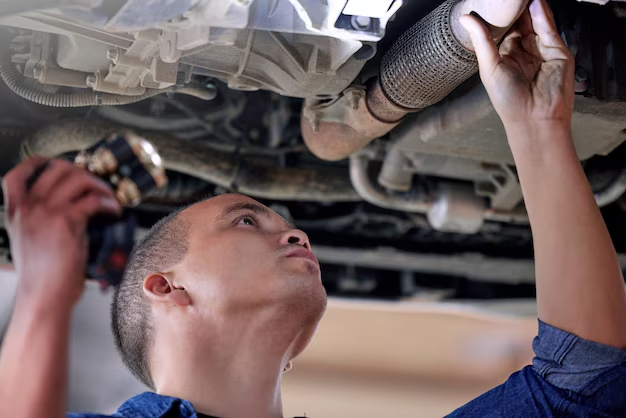
Exhaust Service: Enhancing Performance and Reducing Emissions
Your car’s exhaust system might not be the flashiest part of your vehicle, but it plays a major role in how your car performs, how much fuel it uses, and how clean it runs. Whether you drive a compact commuter, a heavy-duty truck, or something in between, exhaust service is one of those often-overlooked maintenance items that can make or break the way your vehicle runs.
Let’s dive into why taking care of your exhaust system isn’t just about muffler noise—it’s about protecting your investment, your safety, and the environment.

Why the Exhaust System Matters
Every time your engine runs, it produces exhaust gases that need to be safely and efficiently routed away from the engine and out of your vehicle. That’s where the exhaust system comes in. It’s made up of several components, including the exhaust manifold, catalytic converter, oxygen sensors, muffler, and tailpipe. Together, these parts reduce engine noise, filter harmful emissions, and improve fuel economy.
When your exhaust system is in good shape, your vehicle runs cleaner, quieter, and more efficiently. But when it’s compromised—even by a small leak or damaged muffler—you might notice symptoms like poor performance, reduced gas mileage, or even dangerous fumes entering your cabin.
That’s why timely exhaust service and exhaust system maintenance are so essential.
Signs Your Vehicle Needs Exhaust Repair
You don’t need to be a mechanic to know when something’s not right. Your car will usually give you a few warning signs that it’s time to check the exhaust system. Here are the most common red flags:
- Loud or rumbling noises: If your car sounds like a muscle car when it shouldn’t, a damaged muffler or exhaust pipe might be to blame.
- Decreased fuel economy: A leak in the exhaust system can throw off your engine’s air-fuel ratio, making it burn more fuel than necessary.
- Vibrations while driving: If you feel strange vibrations through the steering wheel or pedals, it could be related to an issue in the exhaust mounts or pipes.
- Check Engine Light: Modern vehicles use oxygen sensors to monitor emissions. If something’s wrong, your engine computer might trigger the check engine light.
- Smell of exhaust fumes: This is serious. If you ever smell exhaust inside the cabin, stop driving immediately and have the vehicle checked. It could be carbon monoxide, which is toxic and potentially deadly.
If you’re experiencing any of these issues, it’s time to schedule an exhaust repair before a small problem becomes a costly one.
Key Components of the Exhaust System
Understanding what makes up your exhaust system can help you better appreciate the importance of maintaining it. Here’s a quick overview of the major parts involved in exhaust system maintenance:
1. Exhaust Manifold
This is the first stop for exhaust gases exiting your engine. The manifold collects the gases from each cylinder and funnels them into a single pipe. Cracks or leaks here can lead to performance issues and engine noise.
2. Oxygen Sensors
These sensors monitor the amount of oxygen in your exhaust gases and help your engine maintain the optimal air-fuel mixture. Faulty sensors can cause reduced fuel economy and increased emissions.
3. Catalytic Converter
This critical component converts harmful gases like carbon monoxide, hydrocarbons, and nitrogen oxides into less harmful substances. A failing catalytic converter will not only trip the check engine light but can also severely impact emissions and performance.
4. Muffler
Its job is to muffle the noise your engine produces. When your muffler needs repair, you’ll hear it—literally. Don’t ignore unusual noises; a bad muffler can also impact fuel economy and emissions.
5. Tailpipe
The final step in the journey of your exhaust gases, the tailpipe safely releases them away from your vehicle. It may seem minor, but rust or damage here can signal bigger issues upstream.
How Exhaust Issues Affect Vehicle Performance
You might think that a small exhaust leak isn’t a big deal. But it can have a ripple effect on your vehicle’s health.
A leaky or restricted exhaust system forces your engine to work harder, which means:
- Lower fuel efficiency: More gas is needed to go the same distance.
- Reduced power: You might feel your car dragging or struggling, especially on hills or when accelerating.
- Increased wear and tear: An inefficient engine runs hotter and puts more strain on components, potentially leading to engine damage.
- Failed emissions tests: If you live in a state with emissions inspections, a faulty exhaust system can be an automatic fail.
In short, investing in routine exhaust service doesn’t just keep your car quiet—it helps everything under the hood run more smoothly.
The Importance of Catalytic Converter Service
The catalytic converter is one of the most valuable and environmentally critical components in your vehicle. It’s also one of the most commonly targeted parts for theft due to the precious metals it contains.
But beyond security concerns, keeping your catalytic converter in good working condition ensures your car is reducing harmful emissions effectively. Signs you might need catalytic converter service include:
- A rotten egg smell from your exhaust
- Loss of power, especially when accelerating
- Failed emissions test
- A glowing check engine light related to O2 sensor or emissions codes
Timely catalytic converter service ensures your car stays street-legal, runs clean, and avoids costly fines or repairs down the road.
Why DIY Isn’t Always a Good Idea
While some car maintenance tasks are DIY-friendly, exhaust work often isn’t. Many parts of the exhaust system are bolted or welded underneath the car, exposed to road salt, debris, and rust. Replacing a muffler or a pipe without the right tools, experience, or lift can be difficult and even dangerous.
And when it comes to emission-related repairs, accuracy matters. One misstep can damage sensitive components or cause your check engine light to come back on. That’s why professional diagnostics and repair are the safer, smarter option.
How Often Should You Service the Exhaust System?
While there’s no set mileage for exhaust system maintenance, most experts recommend having your exhaust inspected at least once a year or whenever you come in for routine maintenance like oil changes or tire rotations.
Also, if you drive in areas with lots of moisture, salted roads, or unpaved terrain, you may need inspections more often. Rust and corrosion are some of the biggest enemies of your exhaust system.
At First Class Car Care, we make sure every exhaust inspection includes a thorough check of the system’s pipes, connections, hangers, mufflers, catalytic converters, and oxygen sensors. That way, nothing is overlooked, and you drive away with confidence.
Get Peace of Mind with Expert Exhaust Repair in Dover, DE
Whether you’re hearing strange noises, smelling fumes, or just want to stay on top of your car’s health, don’t wait for exhaust issues to get worse. At First Class Car Care, we specialize in exhaust service, muffler repair, catalytic converter service, and complete exhaust system maintenance for all makes and models.
Our technicians bring over 20 years of hands-on experience, and we back every repair with a commitment to quality and customer satisfaction that’s second to none. Plus, with fast scheduling and free towing with repairs (through our sister company Harris Towing), getting your vehicle back in top shape is easier than ever.
Book your appointment today and see why drivers across Dover trust us for honest, professional service with zero hassle.



